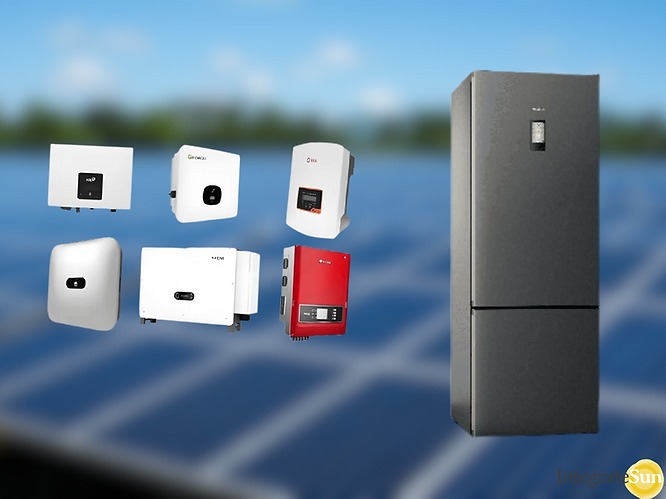 Google Ads Done Right – More Clicks, Less Waste!
Google Ads Done Right – More Clicks, Less Waste!
What Inverter Size Is Needed to Run a Refrigerator?
Written by Prometheuzhrt » Updated on: June 17th, 2025


When transitioning to solar energy, understanding the correct inverter size for your appliances is essential. One of the most crucial appliances to consider is the refrigerator, as it operates continuously to keep food fresh and safe. The right inverter size not only ensures the smooth operation of your refrigerator but also enhances energy efficiency. Let’s dive into the factors to consider and determine the ideal inverter size to run a refrigerator.
Understanding Inverters and Their Role
An inverter is an essential component of a solar power system. It converts direct current (DC) produced by solar panels or batteries into alternating current (AC), which is used by household appliances. Selecting the right inverter size is crucial because an undersized inverter may fail to power the refrigerator, while an oversized one can lead to unnecessary energy losses and higher costs.
Key Factors in Choosing the Right Inverter for a Refrigerator
1. Refrigerator Power Requirements
Refrigerators have varying power requirements depending on their size, type, and energy efficiency rating. To determine the inverter size:
Check the Wattage: Look for the refrigerator’s wattage, which is typically listed on a label inside the door or in the user manual.
Understand Surge Power: Refrigerators require a higher power surge when starting up, often 2-3 times their running wattage. For example, if your refrigerator’s running wattage is 200 watts, its startup surge may reach 600 watts.
2. Continuous vs. Surge Power Ratings
Inverters are rated for both continuous power and surge power. Continuous power is the amount of energy the inverter can supply consistently, while surge power refers to the short burst of energy needed to start appliances like refrigerators.
Ensure the inverter’s surge power capacity can handle the refrigerator’s startup demand.
3. Refrigerator Size and Type
Different refrigerator types have different power needs:
Mini-Fridges: Typically require 100-250 watts.
Standard Refrigerators: Consume 200-800 watts.
Commercial Refrigerators: Demand upwards of 1000 watts.
By knowing your refrigerator type, you can accurately estimate the inverter size.
Calculating the Inverter Size
To calculate the inverter size:
Determine Running and Surge Wattage: Use the refrigerator’s wattage and its startup requirements.
Add a Safety Margin: Multiply the total by 1.25-1.5 to account for inefficiencies and unexpected loads.
Example: If a refrigerator needs 500 watts for startup and 200 watts for continuous operation, choose an inverter with at least 750 watts of surge power and 250 watts of continuous power.
Choosing the Right Inverter
When selecting an inverter, consider the following:
1. Pure Sine Wave Inverters
Refrigerators are sensitive appliances that work best with pure sine wave inverters. These inverters provide clean, stable power similar to the electricity supplied by the grid. Using a modified sine wave inverter may cause the refrigerator to operate inefficiently or even damage the appliance.
2. Efficiency and Capacity
Look for inverters with high energy conversion efficiency to reduce energy loss. Additionally, ensure the inverter has enough capacity to handle other appliances if needed.
3. Battery Compatibility
If your solar system includes battery storage, ensure the inverter is compatible with your battery type and capacity.
Benefits of Solar Power for Refrigerators
Powering your refrigerator with solar energy can significantly lower your electricity bills and reduce your carbon footprint. Leading solar companies like IntegrateSun provide high-quality solar panels and complete systems to meet your energy needs effectively.
1. Energy Independence
Using solar energy to power appliances such as refrigerators gives you independence from grid electricity. This is particularly beneficial during power outages or in remote areas.
2. Cost Savings
Solar power systems have become more affordable, and purchasing high-efficiency solar panels allows you to save money in the long term. Look for reliable providers to buy solar panels that are durable and offer excellent performance.
3. Environmentally Friendly
Solar energy reduces reliance on fossil fuels, minimizing greenhouse gas emissions. By running your refrigerator on solar, you’re contributing to a greener planet.
Real-Life Example: Sizing for a Typical Household Refrigerator
Let’s take a standard refrigerator with the following specifications:
Running Wattage: 250 watts
Surge Wattage: 750 watts
Using the 1.5x rule for safety:
Minimum Continuous Power: 250 watts x 1.5 = 375 watts
Minimum Surge Power: 750 watts x 1.5 = 1125 watts
In this scenario, an inverter with at least 400 watts of continuous power and 1200 watts of surge capacity is ideal. Pair this with a solar system from providers like IntegrateSun, which ensures long-lasting performance.
Tips for Maximizing Energy Efficiency
To reduce the energy demand of your refrigerator:
1. Optimize Temperature Settings
Set your refrigerator to the recommended temperature (35-38°F for the fridge, 0°F for the freezer) to avoid overworking the compressor.
2. Maintain Regular Maintenance
Clean the condenser coils, ensure door seals are tight, and defrost regularly for optimal performance.
3. Upgrade to Energy-Efficient Models
Modern refrigerators with ENERGY STAR ratings consume significantly less power than older models.
Why Choose IntegrateSun for Your Solar Needs?
When shifting to solar energy, partnering with a reliable provider ensures your system's success. IntegrateSun is a trusted name in the solar industry, offering:
Premium Solar Panels: Available for purchase to suit both residential and commercial needs.
Expert Installation Services: Ensuring your solar system operates at peak efficiency.
Comprehensive Support: From initial consultation to post-installation maintenance.
If you’re planning to buy solar panels, IntegrateSun’s high-quality products and professional guidance make it the ideal choice for homeowners and businesses.
Conclusion
Choosing the correct inverter size to run a refrigerator involves understanding the appliance’s power requirements and matching them with an inverter capable of handling both continuous and surge power. A pure sine wave inverter, sufficient capacity, and proper safety margins ensure smooth and efficient operation.
For those interested in solar energy, powering your refrigerator with a solar system from a reputable provider like IntegrateSun is a sustainable and cost-effective solution. By investing in solar technology, you can reduce your energy costs and contribute to a cleaner, greener future.
Start your solar journey today and buy solar panels from trusted experts to enjoy uninterrupted, eco-friendly power for all your appliances.
Note: IndiBlogHub features both user-submitted and editorial content. We do not verify third-party contributions. Read our Disclaimer and Privacy Policyfor details.
Copyright © 2019-2025 IndiBlogHub.com. All rights reserved. Hosted on DigitalOcean for fast, reliable performance.

















